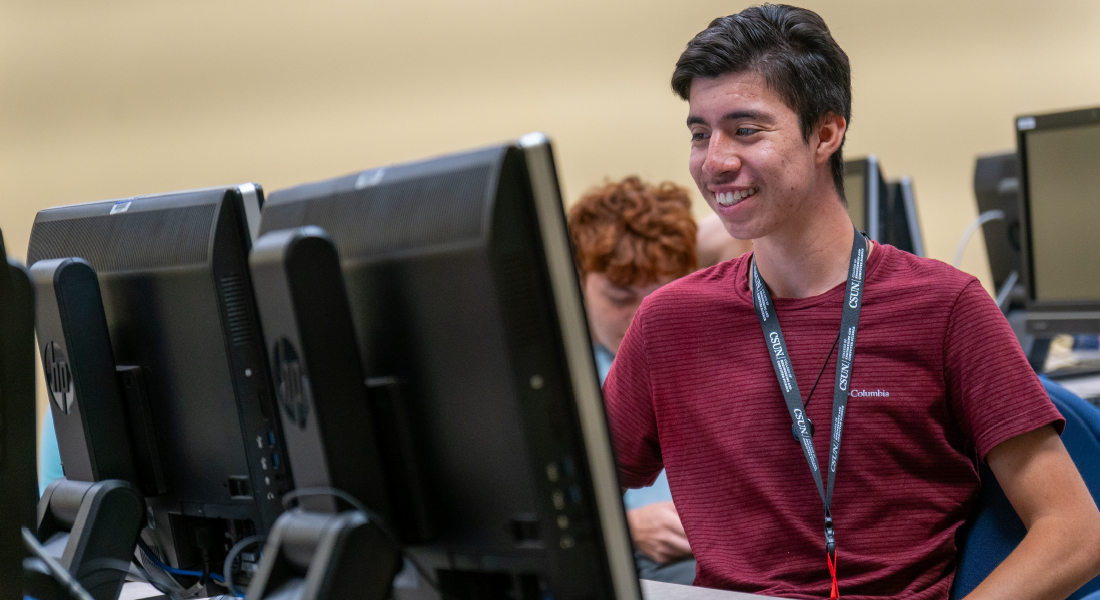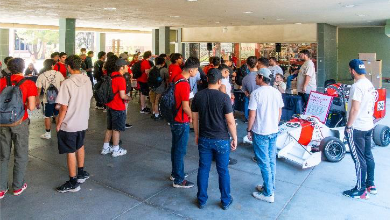M-STEP: A Kickstart to Success in Engineering and Computer Science

Figure 1 Student working on their coursework through ALEKS. Photo by Spencer Hutchison.
As graduating high school seniors prepared to start their first year of college this fall at California State University, Northridge (CSUN), some incoming freshmen had a head start on their coursework through CSUN’s Matador Summer Transition to Engineering and Computer Science Program (M-STEP).
Created by CSUN’s Student Success and Equity Programs Coordinator Vanessa Hernandez and Associate Dean Dr. Xudong Jia of the College of Engineering and Computer Science (CECS), M-STEP is a free 3-week summer bridge program designed to help prepare first-year students majoring in engineering or computer science fields. The program focuses on boosting students’ math skills to get them ready for the rigorous calculus and general mathematics courses they will take during their freshman year.
Beyond academics, M-STEP also helps students transition to college life. Through workshops and special events, participants learn essential skills like time management, goal setting, and study strategies. They also get to connect with CECS student clubs and alumni to gain motivation and insights about potential careers.
ALEKS and Mathematical Success
At the core of the 3-week program is the AI-powered ALEKS online learning platform. ALEKS assesses each student’s current math knowledge then creates a customized program to teach them the concepts they need for calculus and beyond.
ALEKS facilitates a continuous mastery of concepts by assessing individual student knowledge gaps and understanding at the start of each course. Utilizing this information, it tailors a dynamic path for students to learn and master topics at their own pace. This personalized approach empowers students to achieve proficiency in their course material, fostering ongoing learning and growth.
Participants work in ALEKS for the majority of each day, practicing math problems and taking daily quizzes to track their progress. The goal is to fill any knowledge gaps and get students ready to dive right into credit-bearing math classes in the fall.
Outside the Classroom
M-STEP goes beyond math preparation to foster a sense of belonging for new students at CSUN. Through college-hosted workshops and special events, participants engage with current CECS students, gaining valuable insights into the vibrant community and experiences awaiting them within CECS.

Figure 2 Students participating in the Meet the Clubs event. Photo by Spencer Hutchison.
One in particular was the “Meet the Clubs” event, which introduced M-STEP participants to 9 student organizations they could join during their time here at CSUN. From the Society of Women Engineers to the FSAE Matador Motorsports team, there was a student organization for all interests.
Aside from these events, students also attended workshops on essential skills needed for college. For example, a workshop on time management, where they built up skills necessary to ensure timeliness of submitted work and how to keep their academic journey manageable.
M-STEP Results
With an inaugural cohort of 44 students completing the program and participating in the award ceremony this July, M-STEP is already demonstrating success. Some participants from the program have scored high enough on their ALEKS final assessment to place out of usually required pre-calculus classes. And the overall GPA of students who participated in the program is 3.05 as of January 2nd, 2024, resulting in a B average.
The College of Engineering and Computer Science hopes to continue refining and expanding the program. Possible ideas include extending the program length to 4 – 6 weeks, opening eligibility to more incoming students, and conducting additional outreach so students can plan further in advance for the summer opportunity.
If its first year is any indication, M-STEP is poised to become a pipeline for many future Matador engineers and computer scientists. By giving students a head start on college-level academics and connections, the program aims to improve retention and reduce time to graduation for future generations of students to come.
From Bahrain to CSUN: Sara Ali’s Journey to Success
November 13, 2023Awarded Education: Dr. Shawn Sun’s Commitment to Student Growth
October 30, 2023
Leave a reply Cancel reply
-
Student Competitions
May 1, 2009 -
College News
February 6, 2014 -
Awarded Education: Dr. Shawn Sun’s Commitment to Student Growth
October 30, 2023
